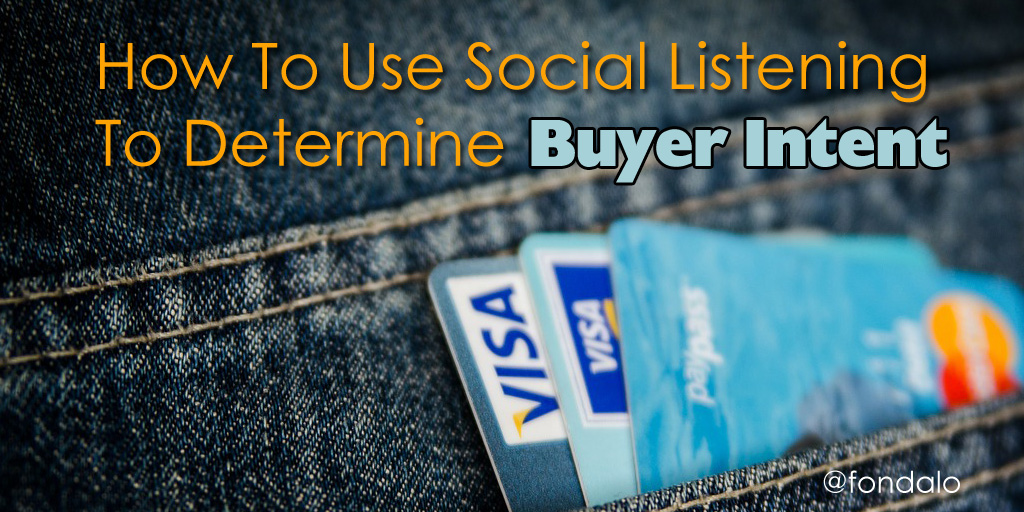How To Use Social Listening To Determine Purchase Intent
Recently I have written a lot about the real changes occurring within social media and digital marketing in general. The transformation we are seeing will dramatically challenge every marketers ability to break through noise, increase results and scale their effectiveness online. As I have discussed previously, at the very heart of these challenges is the every-increasing volume of content being posted by brands and users alike, requiring substantial changes to tactics especially as it relates to listening.
The fact is that in social selling, whether it be consumer or business focused, requires exceptional listening. I am not talking about passive sentiment monitoring around topics or brand names, but active prospect and customer listening that uncovers opportunities. You will always make more money with your ears then you do with your mouth.
As social media marketing continues to transform, social listening must do so as well. What is the difference between listening and hearing? Here’s a quick video I did to define it a little bit. I think it will set the stage for where I believe social listening is going next.
What Is Semantics?
One of the most well known semantic technologies is IBM’s Watson, although it is primarily focused on the enterprise, not the small business. As many of you know, Watson has been in the news for its ability to compete quite accurately on the game show Jeopardy, and is used by many large brands in various applications.
Within the context of social listening, semantic technologies attempt to determine meaning from language, its validity or intent. When this kind of technology can be used to monitor, listen and classify intent within social posts, opportunities to engage with prospects when they have intent for a product or service can be potentially identified. If intent around a specific need or decision to purchase can be accurately identified, then actions can be taken with those prospects that can result is sales.
Uncovering Social Sales Opportunities For Small Business
Recently I have been researching how listening can be used efficiently within social media within the context of the changes we are seeing. Namely, an ability to better uncover sales opportunities using semantics where meaning and context can be determined, allowing local and small businesses to discover and engage prospects at the right time. During my research I cam across nmodes. I believe it has some real promise to efficiently enable social selling.
nmodes semantic technology is based on the notion of an atomic concept that is a property of sentences both in a language and meta-language. A unique ontology was created by nmodes to support this approach. Overall the technology allows for some unique capabilities:
a) accurately extract intent (meaning) from linguistic sets using minimal processing power,
b) add and modify linguistic sets on the fly, essential for providing fast and efficient service in business environment.
 What this means is that nmodes can help identify human intent in unstructured data like messages, posts, tweets and conversations, etc) and use this critical information to help businesses engage, sell and grow sustainably. So based on what users tweet it can accurately determine the intent surrounding their text. Most importantly the nmodes technology can do it quickly, a requirement for it to work in social media marketing.
What this means is that nmodes can help identify human intent in unstructured data like messages, posts, tweets and conversations, etc) and use this critical information to help businesses engage, sell and grow sustainably. So based on what users tweet it can accurately determine the intent surrounding their text. Most importantly the nmodes technology can do it quickly, a requirement for it to work in social media marketing.
Their proprietary technology understands the meaning of digital content and can produce accurate results into streams such as leads, buying habits, customer service concerns, consumer sentiment in regards to brands, consumer behavior patterns. This allows social media marketers to connect with and starts conversations with specific prospects that are identified with specific characteristics or real purchase intent. As you can see an actual stream on the right, nmodes is accurately identifying buyer intent for jeans, then provides the ability to quickly engage the prospect in relevant conversation. Most importantly this can be done at scale since you’re weeding through thousands of tweets just based on hashtags or keywords that do not contain your desired buyer intent.
In my opinion, this kind of semantics capability marks a dramatic difference between normal social listening and monitoring as we have known it. The ability to quickly and accurately identify tweets that correctly match location, intent and meaning is what we call a game changer for small businesses.
Now I want to make sure you understand that this kind of capability is only about 25% of what it takes to make it work. Targeting streams, developing both logistical and conceptual strategies and having huge engagement experience is required to make this all work. Having streams that indicate buyer intent without the other components done properly, will create far more problems. The last thing you want to do is upset or in anyway spam prospects on social media, so the strategy, tact and approach you take will need to be at an expert level if you expect results from this kind of effort.
Finally, I want to be clear that I am not currently a user of nmodes, nor am I being paid to write this. I simply investigated this technology and see it as filling a badly needed hole faced by social media marketers. If you are local brand, small or medium business that needs social selling capabilities that can scale and produce real results, I highly recommend looking into nmodes. The technology is highly complex, so I suggest you connect with them directly so they can map out a custom stream plan that works for your application.
 About Robert Caruso: Recognized on Forbes list of top 40 social media marketers, Robert Caruso is a social media, digital marketing and technology professional with over 20 years creating, planning and executing strategies within various industries. Robert was the co-founder of Bundlepost and holds multiple internet technology patents.
About Robert Caruso: Recognized on Forbes list of top 40 social media marketers, Robert Caruso is a social media, digital marketing and technology professional with over 20 years creating, planning and executing strategies within various industries. Robert was the co-founder of Bundlepost and holds multiple internet technology patents.
Robert writes, speaks and consults on social, relationship and digital marketing.
Originally titled “How To Use Social Media Listening For Buyer Intent” and published on fondalo.com. Republished here with permission.


